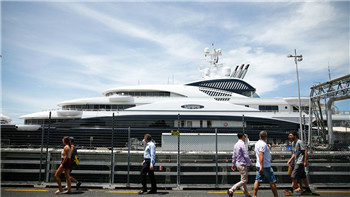
A few days ago, I sailed past Sir Philip Green’s new superyacht Lionheart: nearly 3,000 tonnes of floating bombast at anchor off the Greek island of Skiathos.
前一阵子,我乘船经过菲利普•格林爵士(Sir Philip Green)新的超级游艇Lionheart:重达近3000吨的庞然大物,停泊在希腊斯基亚索斯岛海边。
It reminded me of the only time I boarded such a boat — belonging to another tycoon with pension troubles, Robert Maxwell.
这让我想起我唯一一次登上这类游艇的经历,船主是另一位遭遇养老金麻烦的大亨罗伯特•马克斯韦尔(Robert Maxwell)。
In 1988, he flew me and other journalists to Corsica to join him on the Lady Ghislaine so he could explain his latest publishing deal over lunch.
1988年,他用飞机把我和其他记者载到科西嘉岛,与他一起登上他的游艇Lady Ghislaine,这样他就能在午餐时分跟我们解释他的最新出版交易了。
Three years later, the media mogul disappeared from the same yacht, thus dodging the personal consequences of his looting of the Mirror media group pension funds.
3年后,这位媒体大亨从这座游艇上失踪(后被确认死亡),从而逃避了他窃取媒体集团镜报集团(Mirror)养老金所需接受的责罚。
Unlike Maxwell in 1988, Sir Philip, recently lambasted by MPs for his poor stewardship of retail chain BHS, was not in a forthcoming mood. (He is not accused of any illegality in relation to the underfunding of pensions at BHS, which he sold last year).
与1988年的马克斯韦尔不同,最近因管理零售连锁BHS不善而受到议会议员抨击的菲利普爵士并不怎么愿意与媒体交流(他并未因BHS养老金亏空而被控犯有任何违法行为,他去年出售了这家公司)。
The retailer did not respond to my text offering to buy him a drink and he declined other reporters’ attempts to interview him.
我向这位零售大亨提出一起喝点东西,但他没有回复;他还拒绝了其他记者的采访要求。
But seeing Lionheart — which, at 90m, is 35m longer than Maxwell’s vessel — made me realise how superyachts sum up the flaws and contradictions of business success.
但看到Lionheart(长90米,比马克斯韦尔的游艇长35米)让我意识到,超级游艇概括了商业成功的缺憾和矛盾。
Vastly wealthy men (and a few wealthy women) seem to feel they are the only places they can enjoy undisturbed leisure, living out the fantasy portrayed by Jules Verne in 20,000 Leagues Under the Sea.
拥有巨额财富的男性(以及少数富有女性)似乎认为,游艇是他们能享受不受打扰的休闲时光的唯一场所,领略朱尔•凡尔纳(Jules Verne)在《海底两万里》(20,000 Leagues Under the Sea)中描写的那种幻境。
Its anti-hero Captain Nemo is able to circle the globe in near-total secrecy in a giant submarine, Nautilus, complete with the latest technology, luxurious decor, haute cuisine and a library with books on science, ethics and literature . . . [but not] a single work on economics.
书中的反面人物内莫船长(Captain Nemo)可以驾驶巨型潜水艇鹦鹉螺号(Nautilus)在几乎完全隐秘的情况下环游世界,这艘潜水艇配备最新科技,装饰奢华,提供高级菜肴,还设有一个图书馆,里面有各种书籍——科技、伦理和文学……但没有一本关于经济的书。
Unlike Nautilus, though, superyachts are hard to hide.
与鹦鹉螺号不同,超级游艇很难隐身。
When moored in Monaco alongside others, the billionaires and oligarchs may as well be living in an overlooked suburban semi-detached, albeit one with its own spa, jet skis and, occasionally, small submersible.
在摩纳哥与其他游艇停泊在一起时,这些亿万富翁和寡头们还不如生活在不被人注意的郊区别墅里,那些别墅即便是半独立式,但也有自己的水疗中心、摩托艇,有时还有小型潜水器。
Paradoxically, being seen is often part of the attraction of owning such an oversized vessel.
矛盾的是,被人看到往往是拥有如此超大规模游艇的吸引力的一部分。
Large yachts are meant to enhance the reputation of their owners with ultra-rich peers.
大型游艇旨在提高所有者在其他超级富豪中的声誉。
But when things go wrong, they undermine their image.
但当情况变糟时,它们会破坏所有者的形象。
When I tweeted a picture of Lionheart, a number of people pointed out that Sir Philip’s sundeck was within range of a well-aimed rotten tomato.
当我在Twitter上贴出Lionheart的照片时,很多人指出,如果瞄的准的话,一个烂番茄可以砸中菲利普爵士的日光甲板。
In The New New Thing, Michael Lewis chronicles Jim Clark’s obsession with Hyperion, his computer-controlled yacht, as the dotcom bubble inflated in the late 1990s.
在《新新事物》(The New New Thing)一书中,迈克尔•刘易斯(Michael Lewis)记录了在上世纪90年代末,网络泡沫膨胀时,吉姆•克拉克(Jim Clark)对他由电脑控制的游艇Hyperion的痴迷。
At one point, Netscape’s co-founder learns someone is building a bigger boat: One minute he could say, ‘Who cares which rich guy has the tallest mast?’ — and actually believe every word of it.
这位网景(Netscape)联合创始人得知有人在建造一艘更大的游艇:他这一分钟可能会说:‘谁在乎哪个富人的桅杆最高?’说的时候是出于真心。
The next minute he would be standing [with] the mast jutting out from him like an enormous black phallus and booming ‘Mine’s sixty metres.
下一分钟就站在船上,桅杆像巨大的黑色阴茎一样伸出去,并炫耀着‘我的是六十米。
How long is yours?’.
你的有多长?’
Lewis witnessed intelligence and testosterone . . . wrestling for hegemony.
刘易斯见证的是理智与睾丸素……在交战,争夺控制权。
It is easy to see how such a wrestling match could transfer from the bridge to the boardroom, where corporate leaders already love to picture themselves as masters of ships tossed by unpredictable storms.
很容易看到这种较量可能会从船上的驾驶台转移到董事会,在董事会,企业领袖已然喜欢把自己描述为船长,为在不可预测的风暴中颠簸前行的船只掌舵。
There is a good reason why Nemo banned economics books from his on-board library: the economics of building and running such vessels are terrifying.
内莫船长禁止他船上的图书馆里出现经济方面的书籍有一个很好的理由:建造和管理这种超级游艇极度划不来。
Sir Philip (or possibly his wife, who owns the retail empire) reportedly paid $150m for Lionheart; the world’s biggest superyacht, the 180m Azzam, cost the sheikh who probably owns it well over twice that.
据报道,菲利普爵士(或者可能是拥有这个零售王国的他妻子)为Lionheart支付了1.50亿美元;全球最大游艇——180米长的Azzam,让那位可能拥有它的阿拉伯酋长支付的价格远不止前者的两倍。
Towergate Insurance, which last year compiled a list of the true costs of such showboats, says cover alone could run to $240,000 annually.
Towergate Insurance去年编制了一份超级游艇真实成本的列表,该公司表示,仅每年的保险就可能高达24万美元。
Operating costs amount to at least 10 per cent of the purchase price.
运行成本至少为购买价的10%。
No wonder most owners hang on to their boats for only three years and that J Pierpont Morgan supposedly uttered the line if you have to ask the price, you can’t afford it to warn a contact against following him into yacht ownership.
因此多数所有者只保留3年就毫不奇怪了,据说,JP•摩根(J. Pierpont Morgan)曾说出这样的话来警告一位希望像他那样购买游艇的朋友:如果你非要问价格,你是买不起的。
I can see only two advantages to owning large boats.
我认为拥有大型游艇只有两个好处。
One is to indulge at scale a childhood hobby, as dedicated sailor Sir Charles Dunstone, the Carphone Warehouse founder, does.
第一是极大地满足儿时的爱好,就像酷爱航海的手机零售商卡冯-维尔豪斯集团(Carphone Warehouse Group)创始人查尔斯•邓斯通爵士(Sir Charles Dunstone)所做的那样。
Another is making beautiful boats seaworthy again, as household gadget grandee Sir James Dyson has done by restoring Nahlin, a 1930s steam yacht, seems a worthy allocation of funds.
另一个原因是,花钱让美丽的游艇能够再次出海(就像家用电器巨擘詹姆斯•戴森爵士(Sir James Dyson)翻修上世纪30年代的蒸汽游艇Nahlin那样)似乎是值得的。
In general, though, while nothing stops magnates spending honestly earned billions with as little taste and as much extravagance as they can afford, most superyacht purchases reflect all their worst traits: hubris, personal greed, an over-aggressive need to compete and a disregard for public opinion.
总之,尽管什么都不能阻止大亨们在可承受的范围内,以极低的品味和极大的浮夸花掉他们诚实赚来的钱财,但多数超级游艇的购置反映出他们最恶的品性:自大、个人贪婪、过于好胜以及对公众意见的漠视。
Worse, superyachts allow their owners to indulge a Nemo-like illusion that they can cast off from the real world, where, as Maxwell discovered and Sir Philip may yet, judgment can be harsh, retribution painful and nemesis as hard to avoid as an uncharted reef.
更糟的是,超级游艇让它们的所有者沉浸在内莫船长那样的错觉中,以为自己可以摆脱真实的世界,在真实世界里,如马克斯韦尔曾经发现、菲利普爵士也可能将要发现的那样,审判可能是残酷的,惩罚可能是痛苦的,报应可能就像未知的礁石那样难以避免。











